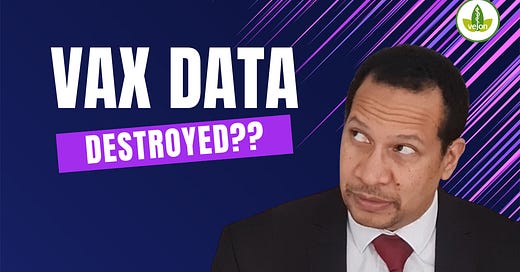I couldn’t believe what I was reading. One of the most important vaccine safety datasets in the world—containing over 11 million data points, 100,000 biospecimens, and tracking the health outcomes of 10,000 Queenslanders—was about to be destroyed. And the only thing that stopped it? Public outrage.
This wasn’t just any dataset. The QoVAX study was designed to do what so few other COVID-19 studies managed: track vaccinated and unvaccinated individuals in a largely COVID-naive population, looking at real-world immune responses, genetic variation, and long-term health outcomes. The aim? To answer crucial questions about COVID-19 vaccines, including their safety and efficacy in people with autoimmune disease or immune suppression. Questions I—and many others—have been asking since 2021.
When I first heard of QoVAX being axed, I assumed it was just another case of funding cuts. But what unfolded was far more disturbing. Queensland Health didn’t just defund the $20 million study in 2023—they moved to destroy the biospecimens and all the associated data. Why would anyone erase a dataset so rich in potential insights? Their official reason—that the data was outdated due to newer variants—simply doesn’t hold. The pre-variant, COVID-naive nature of the population is what makes the data uniquely valuable. In science, we treasure that kind of baseline data. We don’t throw it away.
Queensland COVID-19 Vaccination Safety and Efficacy Statewide Study
I can’t help but suspect the real reason lies elsewhere. Perhaps it’s fear of what the data might reveal—particularly about immune responses after multiple exposures to the spike protein, whether by infection or vaccination. Perhaps it’s about liability. If vaccinated individuals do show worse outcomes after reinfection—as some early data suggests—this dataset could confirm it. Or maybe it could offer clarity about long-term impacts of repeated boosting. Either way, the truth matters, and destroying the data looks less like science and more like self-preservation.
The good news? People pushed back. A petition to the Queensland Parliament, outcry from participants, and intervention from concerned legislators like Senator Gerard Rennick forced Queensland Health to halt the destruction, pending a review. For now, the data is safe.
But I’m still uneasy. Why was Professor Janet Davies—the study’s lead—removed? Why were official pages about QoVAX quietly deleted? And why were participants informed only after the fact that their samples were considered “no longer of value”? The secrecy here undermines public trust and scientific integrity.
In a world where vaccine injury claims are increasing and many governments are pushing for annual boosters, we need robust, transparent data more than ever. QoVAX could help explain not only how different people respond to the vaccine, but why some go on to suffer chronic symptoms while others don’t. It could help uncover the role of HLA types or underlying inflammation. It might even inform future vaccine development.
Science only thrives when data is preserved, shared, and studied. Destroying evidence is antithetical to everything I’ve ever stood for. If the vaccines are as safe as many claim, why not let the science speak?
Thanks to the Queensland public, this vital resource wasn’t quietly wiped from history. But we can’t relax. The review is ongoing, and its outcome uncertain. We must keep the pressure on to ensure the data is not only preserved, but analysed independently and without interference.
Because if we let this slide, what will be destroyed next?
Vejon COVID-19 Review is a reader-supported publication. To receive new posts and support my work, consider becoming a free or paid subscriber.













Share this post